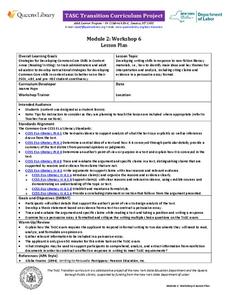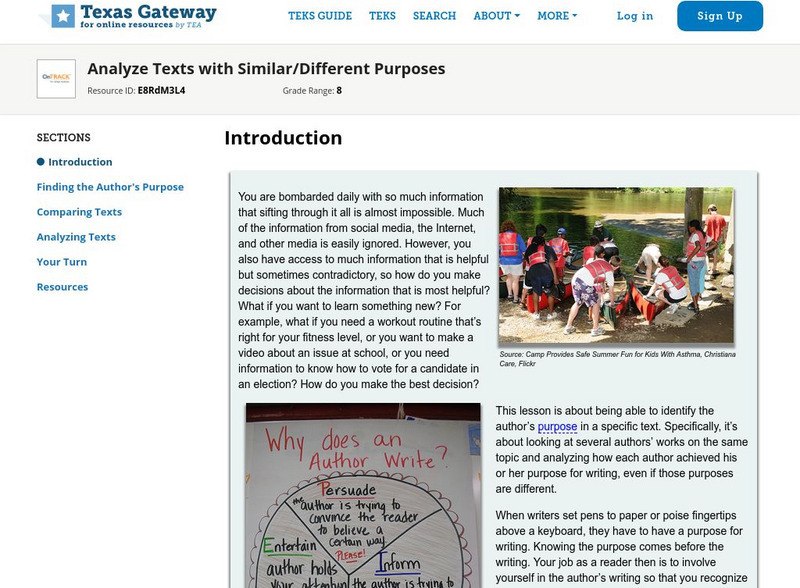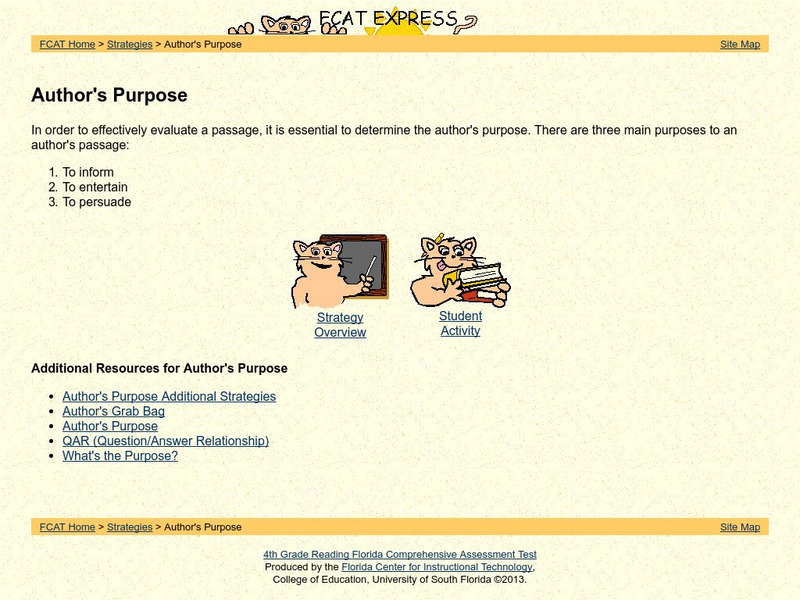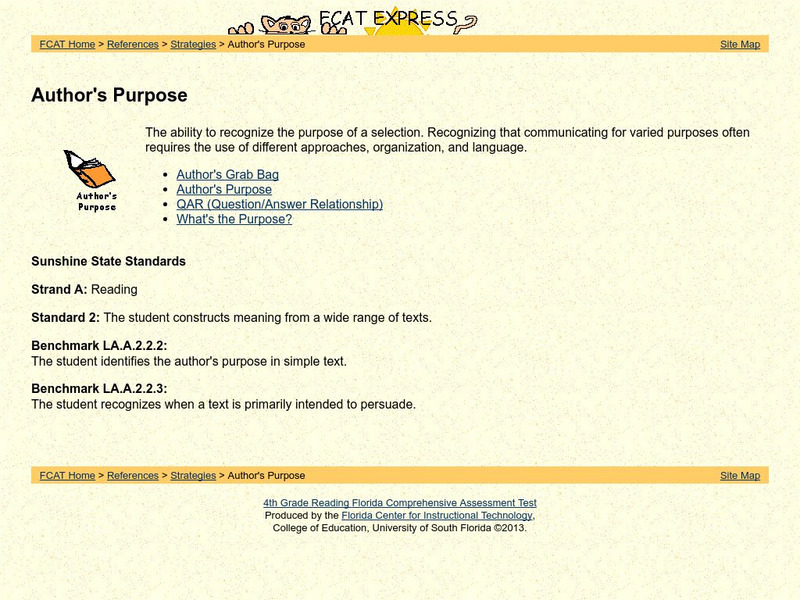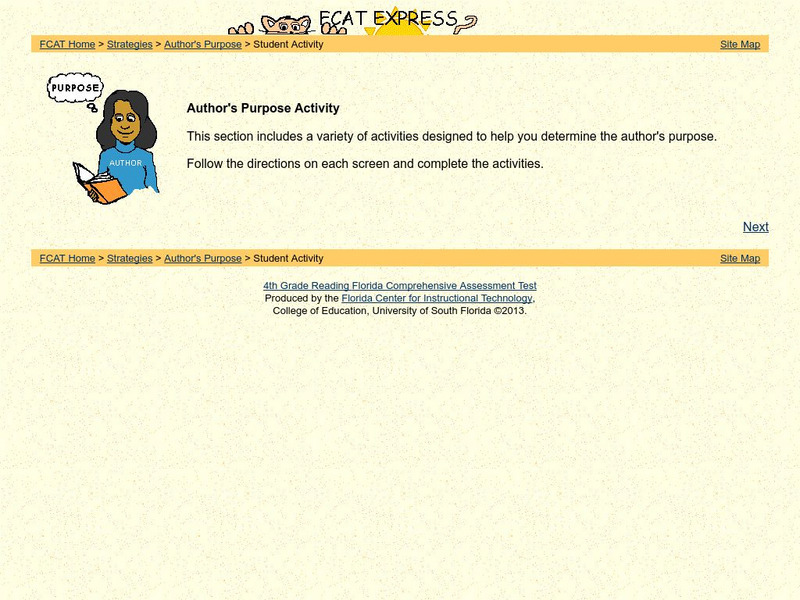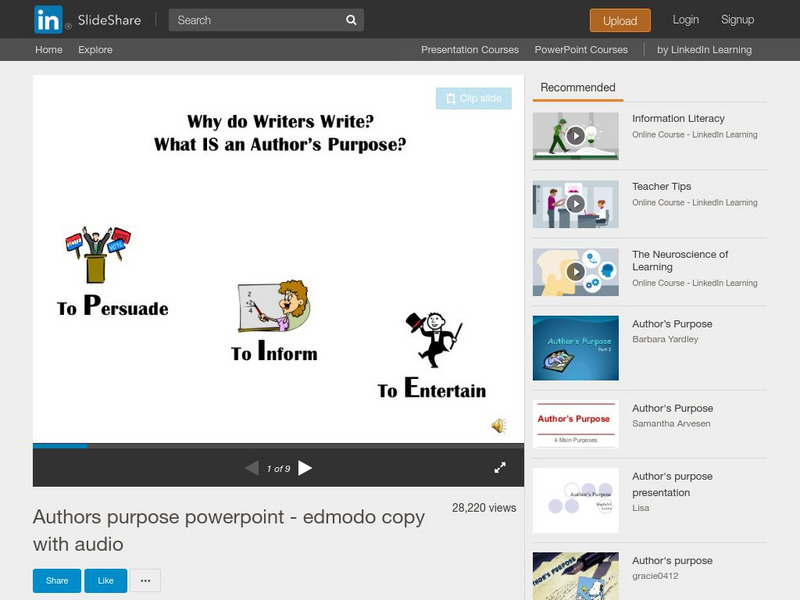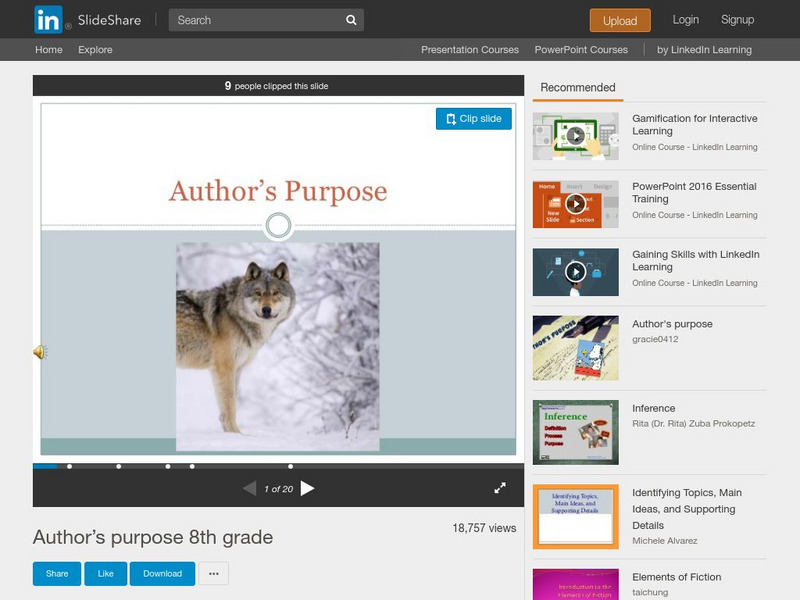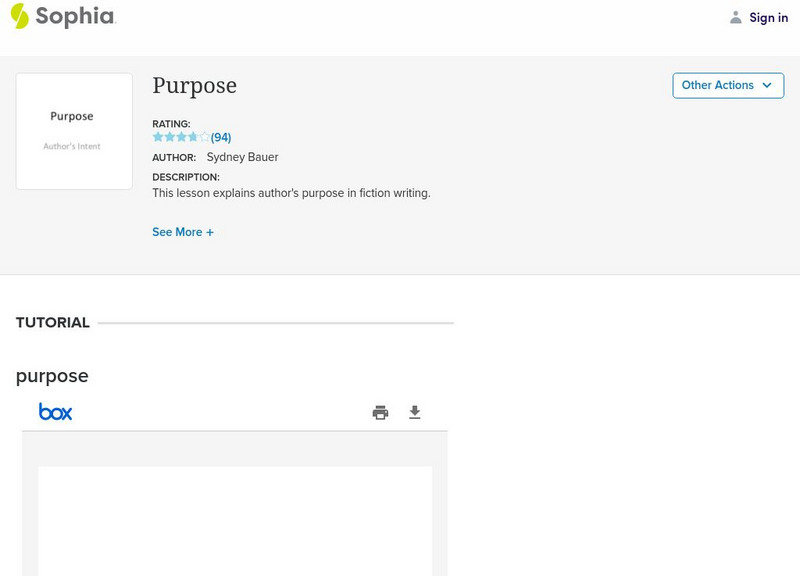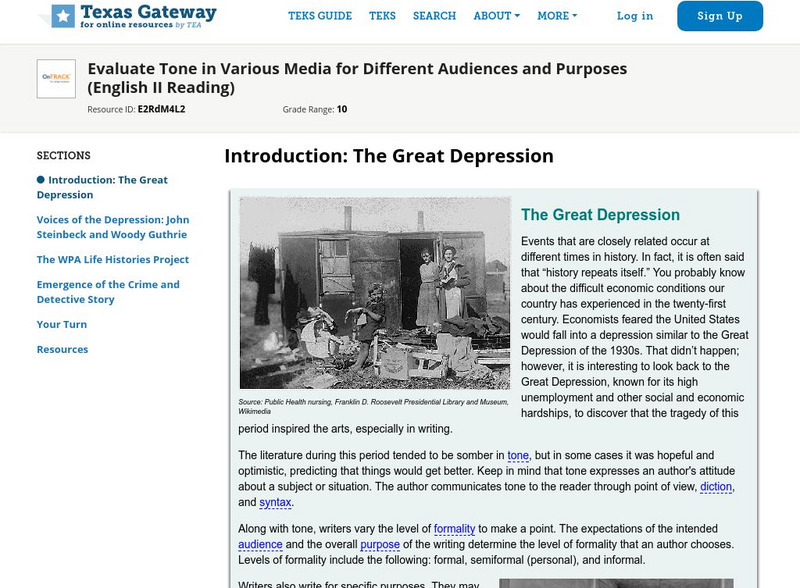EngageNY
TASC Transition Curriculum: Workshop 15
What do a cheetah, Audi commercial, and air have in common? They're all topics of an engaging inquiry-based, hands-on workshop for educators about background knowledge, reading strategies, the CER model, and argumentative writing. The...
EngageNY
TASC Transition Curriculum: Workshop 12
How can opinions slant facts? Workshop participants learn how to examine primary and secondary sources and identify the author's point of view. They also examine how visual art impacts the meaning and rhetoric of sources. Full of...
EngageNY
TASC Transition Curriculum: Workshop 6
Is a college education necessary for success in today's world? The class investigates the question, along with others at the end of the sixth workshop in a 15-part series. The instructional activity has four parts with multiple...
Texas Education Agency
Texas Gateway: Analyze Texts With Similar/different Author's Purpose
[Accessible by TX Educators. Free Registration/Login Required] This lesson focuses on being able to identify the author's purpose in a specific text. Specifically, it's about looking at several authors' works on the same topic and...
Better Lesson
Better Lesson: Finding the Author's Purpose
What is autism? How does it affect behavior? Students will find evidence of the author's tone or purpose for writing the article, as well as hints that show evidence of opinion. Includes a video clip from the movie "Rainman", and an...
E Reading Worksheets
E Reading Worksheets: Author's Purpose Lesson
In this learning module, students will learn about authors' purposes for writing. PowerPoint lessons, worksheets, and quizzes are provided to reinforce the understanding of why authors write assorted pieces. This module is designed to...
Read Works
Read Works: Fourth Grade: Three Lesson Unit: Author's Purpose
[Free Registration/Login Required] A three-lesson unit on author's purpose where students learn to identify author's purpose, categorize texts according to author's purpose, and change author's purpose by rewriting a text. With free...
Read Works
Read Works: Lesson: Author's Purpose: Cause and Effect Signal Words
[Free Registration/Login Required] With this lesson plan, students can learn how several authors can write about the same topic, but for different purposes.
University of South Florida
Fcat Express: Author's Purpose
Site provides extensive assistance in preparing 4th grade students for Florida Comprehensive Assessment Test. This section focuses on identifying the author's purpose.
University of South Florida
Fcat Express: Author's Purpose
Some author's purpose teaching ideas from a standardized test preparation site (Fourth Grade Reading Florida Comprehensive Assessment Test). Aligned to Florida standards, four ideas are provided including "Author's Grab Bag," "Author's...
Read Works
Read Works: Author's Purpose 3rd Grade Unit
[Free Registration/Login Required] A three-activity unit on author's purpose. In the first activity, students practice identifying the author's purpose as to entertain, to persuade, or to inform. In the second activity, students use...
Texas Education Agency
Texas Gateway: Analyze Texts With Similar/different Purposes
[Accessible by TX Educators. Free Registration/Login Required] This lesson is about being able to identify the author's purpose in a specific text. Specifically, it's about looking at several authors' works on the same topic and...
University of South Florida
University of South Florida: Fcat Express: Author's Purpose Activity
Practice identifying author's purpose by recognizing the purpose in titles, understanding the difference between fact and opinion, and identifying the purpose of various forms of writing.
Tom Richey
Slide Share: Why Do Writers Write?
A slide show with nine slides explaining the author's purpose to persuade, inform, or entertain.
Tom Richey
Slide Share: Author's Purpose 8th Grade
A slideshow with twenty slides with information and examples of four different purposes an author can have for writing a text: to entertain, to persuade, to express, or to inform/explain.
Sophia Learning
Sophia: Purpose
This slideshow lesson focuses on purpose; it defines purpose and lists the two main purposes of all writing: to educate (didactic text meaning to inform and instruct) or to entertain (imaginative text). The purpose could also be art for...
Texas Education Agency
Texas Gateway: Evaluate Tone in Various Media for Different Audiences & Purposes
This lesson will help you evaluate changes in formality and tone within printed texts written for specific audiences and purposes. It focuses on writing produced during the Great Depression.
Other
City College: Skills for Life: Reading for a Purpose
This resource offers 11 exercises with variety of everyday reading passages such as letters, recipes, classified ads, etc. Students read the passage and answer multiple choice questions about its purpose.
Quia
Quia: Author's Purpose Battleship
A game of battleship where each time the player hits the enemy's ship, he or she reads a short passage and then chooses the author's purpose for writing it. Answer enough questions correctly, and sink the enemy's battleship.
Utah Education Network
Uen: What Makes the Writer Write?
This lesson engages students in reading and research related to the Victorian Era. Students will analyze this time period's influence on the writings of Charles Dickens. Then students will analyze how today's authors incorporate social...
Texas Education Agency
Texas Gateway: Explain the Controlling Idea, Purpose, and Distinguish Details
[Accessible by TX Educators. Free Registration/Login Required] In this lesson, students will learn how to pinpoint the controlling idea, which not only identifies the main idea, but also answers questions about the author's goal or...
PBS
Pbs Learning Media: Reach: Recipe for Writing!
REACH for more! Be an author! Write and illustrate your very own story by mixing up a simple recipe of WHO, WHERE, WHAT, and ENDING.
Reading Rockets
Reading Rockets: Looking at Writing: First Grade
First graders write many times a day to express their interests - they are writing with a purpose through stories, letters, and lists. In this section, you'll find writing assessment resources, writing strategies, and additional tip...
ReadWriteThink
Read Write Think: Defining and Exploring an Author's Stylistic Choices
Contains plans for two lessons that teach students how to recognize an author's use of style in literature. These plans use "Their Eyes Were Watching God" by Zora Neale Hurston as an example, but the basic ideas can be adapted to other...


